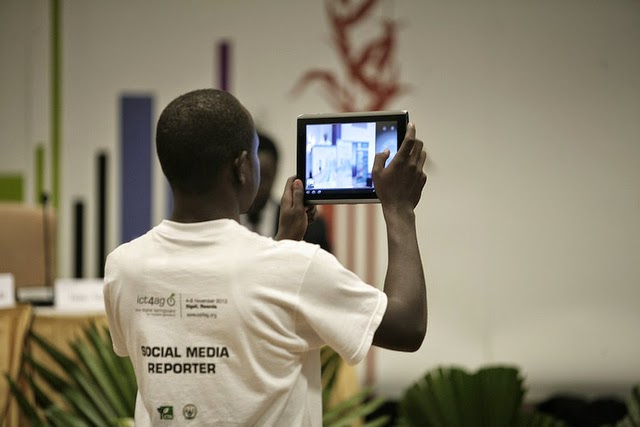 |
Mr Prosper V. Mgalama from
Tanzania Public Service College |
Today’s Parallel Session II at SCECSAL 2014 focused on agricultural information services in socio-economic development.
WiseGeek defines socio-economic development as "a process that seeks to identify both the social and the economic needs within a community, and seek to create strategies that will address those needs in ways that are practical and in the best interests of the community over the long run".
Socio-economic activities and needs in most rural communities in Africa revolve around farming. Providing access to appropriate agricultural information and knowledge on agricultural technologies and sustainable practices can therefore contribute to increasing incomes and improving livelihoods of the rural farmers. It was therefore good to see librarians discussing the role they could play in meeting the information needs of rural farmers.
The following presentations were made at the session:
- The Role of Agricultural Services in Socio-economic Development in East Africa; A Critical Review - Mr Prosper V. Mgalama, Tanzania Public Service College
- The role of Kasisi Agricultural Training Centre in providing information on organic to the small scale farmers in Kasisi area of Chongwe District, Zambia - Ms Naomi Mtanga, Department of Library and Information Studies, University of Zambia.
- A Hidden factor hindering agriculture in bringing socio-economic development in Tanzania and other Sub-Sahara countries - Mr. Martin Tetti, Tanzania Public Service College
The discussions at the end of the session focused on what could be the role of libraries in the provision of agricultural information to farmers.
Libraries serve defined communities of users. For example, university libraries target university communities made up of students, lecturers, researchers, etc; school libraries mainly respond to the information needs of the students; public libraries target the residents in their communities; special libraries are largely closed and only serve members of the parent organizations.
Rural farmers are a highly specialised category of information users. For example, they need information about markets and prices for their produce; weather information; information on agricultural inputs and agricultural finance, etc. The information is sourced from several different organizations including markets, banks, metrological stations, etc. The information also has to be processed and re-packaged into formats that suit the needs of the farmers.
In my view, provision of appropriate agricultural information services to rural farmers goes beyond the mandate of most librarians and libraries in Africa. Most of these institutions are located in cities and are not in touch with the farming communities in rural areas. They also lack financial resources to carry out the demanding activities required to provide high quality and specialised agricultural information services. Some do not even have access to sustainable ICT infrastructure, and staff with appropriate skills. Public libraries located in rural areas, that could be the best options for this service, are among the most neglected libraries in most countries.
What role could librarians and libraries in Africa play in the provision of agricultural information services to rural farmers?























